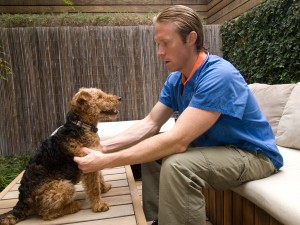Have you already started any healthful life changes for yourself or your pet in 2011? Although I wish you well, I am concerned mostly about the health of your pets. Check out my New Years Resolutions for Your Pet Part 1- Focus on Diet and Part 2- Commit to Daily Exercise, then follow my 3rd (and final) recommendation to optimize the quality of life of your canine or feline companion in 2011.
 Part 3- Schedule Regular Veterinary Examinations
Do you have an annual wellness exam with your doctor? You should, as your medical practitioner can observe any illness trends to readily diagnose and treat disease.
Apply the same principle to your pet’s health by scheduling a wellness physical exam by your veterinarian at least every 12 months. Geriatric pets (greater than 7 years of age) and those having any ongoing health issues (including arthritis, endocrine disease, cancer, and allergic skin disease) should be examined more frequently.
Commit to immediately resolving any health problems your veterinarian discovers before irreversible damage occurs. One of the main examples which I proactively address in my clinical practice is periodontal disease.
The oral cavity is a source of infection and inflammation that can adversely affect the health of internal organs (kidneys, liver, heart, pancreas, other) and the immune system. Dr. Jan Bellows, Diplomate of the American Veterinary Dental College, defines periodontal disease as “the disease process that begins with gingivitis (inflammation of gingiva, or gum tissue) and progresses to periodontitis (erosion of the teeth’s supporting structures) when left untreated”. According to a recent study done by Purdue University School of Veterinary Medicine professor of epidemiology, Larry Glickman, a statistically increased incidence of heart disease in dogs is associated with increasing severity of periodontal disease.
Part 3- Schedule Regular Veterinary Examinations
Do you have an annual wellness exam with your doctor? You should, as your medical practitioner can observe any illness trends to readily diagnose and treat disease.
Apply the same principle to your pet’s health by scheduling a wellness physical exam by your veterinarian at least every 12 months. Geriatric pets (greater than 7 years of age) and those having any ongoing health issues (including arthritis, endocrine disease, cancer, and allergic skin disease) should be examined more frequently.
Commit to immediately resolving any health problems your veterinarian discovers before irreversible damage occurs. One of the main examples which I proactively address in my clinical practice is periodontal disease.
The oral cavity is a source of infection and inflammation that can adversely affect the health of internal organs (kidneys, liver, heart, pancreas, other) and the immune system. Dr. Jan Bellows, Diplomate of the American Veterinary Dental College, defines periodontal disease as “the disease process that begins with gingivitis (inflammation of gingiva, or gum tissue) and progresses to periodontitis (erosion of the teeth’s supporting structures) when left untreated”. According to a recent study done by Purdue University School of Veterinary Medicine professor of epidemiology, Larry Glickman, a statistically increased incidence of heart disease in dogs is associated with increasing severity of periodontal disease.
 Your pet will benefit from habitual teeth brushing along with an anesthetic or non-anesthetic teeth cleaning pending your veterinarian’s evaluation. I brush Cardiff’s teeth three times a week (using a “retired” Sonicare toothbrush and CET Toothpaste) and Cardiff gets a non-anesthetic dental every 4-6 months.
Thank you for reading my article. To receive my next article via email, please press the “Don’t Miss a Blog Post” button on the right upper corner of this page or follow this link.
Copyright of this article (2011) is owned by Dr. Patrick Mahaney, Veterinarian and Certified Veterinary Acupuncturist. Republishing any portion of this article must first be authorized by Dr. Patrick Mahaney. Requests for republishing must be approved by Dr. Patrick Mahaney and received in written format.
Your pet will benefit from habitual teeth brushing along with an anesthetic or non-anesthetic teeth cleaning pending your veterinarian’s evaluation. I brush Cardiff’s teeth three times a week (using a “retired” Sonicare toothbrush and CET Toothpaste) and Cardiff gets a non-anesthetic dental every 4-6 months.
Thank you for reading my article. To receive my next article via email, please press the “Don’t Miss a Blog Post” button on the right upper corner of this page or follow this link.
Copyright of this article (2011) is owned by Dr. Patrick Mahaney, Veterinarian and Certified Veterinary Acupuncturist. Republishing any portion of this article must first be authorized by Dr. Patrick Mahaney. Requests for republishing must be approved by Dr. Patrick Mahaney and received in written format.
 Part 3- Schedule Regular Veterinary Examinations
Do you have an annual wellness exam with your doctor? You should, as your medical practitioner can observe any illness trends to readily diagnose and treat disease.
Apply the same principle to your pet’s health by scheduling a wellness physical exam by your veterinarian at least every 12 months. Geriatric pets (greater than 7 years of age) and those having any ongoing health issues (including arthritis, endocrine disease, cancer, and allergic skin disease) should be examined more frequently.
Commit to immediately resolving any health problems your veterinarian discovers before irreversible damage occurs. One of the main examples which I proactively address in my clinical practice is periodontal disease.
The oral cavity is a source of infection and inflammation that can adversely affect the health of internal organs (kidneys, liver, heart, pancreas, other) and the immune system. Dr. Jan Bellows, Diplomate of the American Veterinary Dental College, defines periodontal disease as “the disease process that begins with gingivitis (inflammation of gingiva, or gum tissue) and progresses to periodontitis (erosion of the teeth’s supporting structures) when left untreated”. According to a recent study done by Purdue University School of Veterinary Medicine professor of epidemiology, Larry Glickman, a statistically increased incidence of heart disease in dogs is associated with increasing severity of periodontal disease.
Part 3- Schedule Regular Veterinary Examinations
Do you have an annual wellness exam with your doctor? You should, as your medical practitioner can observe any illness trends to readily diagnose and treat disease.
Apply the same principle to your pet’s health by scheduling a wellness physical exam by your veterinarian at least every 12 months. Geriatric pets (greater than 7 years of age) and those having any ongoing health issues (including arthritis, endocrine disease, cancer, and allergic skin disease) should be examined more frequently.
Commit to immediately resolving any health problems your veterinarian discovers before irreversible damage occurs. One of the main examples which I proactively address in my clinical practice is periodontal disease.
The oral cavity is a source of infection and inflammation that can adversely affect the health of internal organs (kidneys, liver, heart, pancreas, other) and the immune system. Dr. Jan Bellows, Diplomate of the American Veterinary Dental College, defines periodontal disease as “the disease process that begins with gingivitis (inflammation of gingiva, or gum tissue) and progresses to periodontitis (erosion of the teeth’s supporting structures) when left untreated”. According to a recent study done by Purdue University School of Veterinary Medicine professor of epidemiology, Larry Glickman, a statistically increased incidence of heart disease in dogs is associated with increasing severity of periodontal disease.
 Your pet will benefit from habitual teeth brushing along with an anesthetic or non-anesthetic teeth cleaning pending your veterinarian’s evaluation. I brush Cardiff’s teeth three times a week (using a “retired” Sonicare toothbrush and CET Toothpaste) and Cardiff gets a non-anesthetic dental every 4-6 months.
Thank you for reading my article. To receive my next article via email, please press the “Don’t Miss a Blog Post” button on the right upper corner of this page or follow this link.
Copyright of this article (2011) is owned by Dr. Patrick Mahaney, Veterinarian and Certified Veterinary Acupuncturist. Republishing any portion of this article must first be authorized by Dr. Patrick Mahaney. Requests for republishing must be approved by Dr. Patrick Mahaney and received in written format.
Your pet will benefit from habitual teeth brushing along with an anesthetic or non-anesthetic teeth cleaning pending your veterinarian’s evaluation. I brush Cardiff’s teeth three times a week (using a “retired” Sonicare toothbrush and CET Toothpaste) and Cardiff gets a non-anesthetic dental every 4-6 months.
Thank you for reading my article. To receive my next article via email, please press the “Don’t Miss a Blog Post” button on the right upper corner of this page or follow this link.
Copyright of this article (2011) is owned by Dr. Patrick Mahaney, Veterinarian and Certified Veterinary Acupuncturist. Republishing any portion of this article must first be authorized by Dr. Patrick Mahaney. Requests for republishing must be approved by Dr. Patrick Mahaney and received in written format.